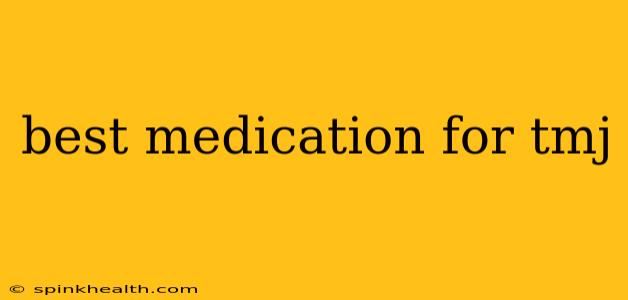Finding Relief: Your Journey Through TMJ Medication Options
The persistent ache, the clicking jaw, the headaches that seem to never end – living with temporomandibular joint disorder (TMJ) can feel like a constant battle. Finding the right treatment is crucial, and medication often plays a vital role in managing the symptoms. But the path to relief isn't always straightforward; there's no single "best" medication for TMJ, as the ideal approach depends on your specific symptoms and overall health.
Let's embark on a journey to understand the various medications used to treat TMJ, addressing some common questions along the way. Think of this as your personal guide, empowering you to have an informed conversation with your doctor or dentist about your treatment options.
What are the most common medications prescribed for TMJ?
This is often the first question on many people's minds. The answer isn't a simple list of names, but rather a categorization based on the type of symptoms the medication targets. Often, a combination of approaches is used.
-
Pain Relievers: Over-the-counter options like ibuprofen (Advil, Motrin) or naproxen (Aleve) can effectively manage mild to moderate TMJ pain. For more intense pain, your doctor might prescribe stronger pain relievers, possibly including opioids in certain cases, though these are generally used cautiously due to potential side effects.
-
Muscle Relaxants: TMJ often involves muscle spasms and tension. Muscle relaxants, like cyclobenzaprine (Flexeril) or carisoprodol (Soma), can help alleviate this tension, reducing pain and improving jaw mobility. These are typically prescribed short-term due to the potential for dependence.
-
Anti-inflammatory Drugs: Inflammation plays a significant role in TMJ pain. Nonsteroidal anti-inflammatory drugs (NSAIDs), such as ibuprofen, naproxen, or celecoxib (Celebrex), can help reduce inflammation and ease pain. Your doctor might recommend a stronger anti-inflammatory if NSAIDs are ineffective.
-
Antidepressants and Anti-anxiety Medications: Surprisingly, some antidepressants and anti-anxiety medications, particularly tricyclic antidepressants (TCAs) like amitriptyline, can be effective for managing chronic TMJ pain, especially when pain is accompanied by depression or anxiety. This is because they have both analgesic (pain-relieving) and muscle relaxant properties.
What are the side effects of TMJ medication?
This is a crucial consideration. Every medication carries potential side effects, and it's essential to discuss these with your doctor or dentist. Side effects vary greatly depending on the specific medication and your individual sensitivity. Common side effects can include:
- Gastrointestinal issues: Nausea, heartburn, stomach upset.
- Drowsiness or dizziness: Muscle relaxants and some pain relievers can cause drowsiness.
- Headaches: Ironically, some medications can cause headaches.
- Dependence or withdrawal symptoms: Opioids and some muscle relaxants can lead to dependence with prolonged use.
Are there any natural remedies for TMJ?
While medication plays a crucial role for many, some natural remedies can complement medical treatments or provide relief for milder cases. These approaches often focus on managing stress, improving posture, and reducing muscle tension:
- Heat and Ice Packs: Applying heat or ice packs to the affected area can provide temporary pain relief.
- Stress Management Techniques: Stress often exacerbates TMJ symptoms, so practicing relaxation techniques like yoga, meditation, or deep breathing exercises can be beneficial.
- Dietary Changes: Avoid hard-to-chew foods that strain the jaw.
- Physical Therapy: A physical therapist can teach you exercises to improve jaw mobility and reduce muscle tension.
What if medication doesn't help my TMJ?
If medication alone doesn't provide adequate relief, don't despair. Your dentist or doctor might recommend additional treatments like:
- Occlusal splints (mouthguards): These custom-fitted devices help realign the jaw and reduce strain on the TMJ.
- Injections: Corticosteroid injections can reduce inflammation.
- Surgery: In severe, unresponsive cases, surgery might be considered as a last resort.
Remember, this information is for educational purposes only and does not constitute medical advice. Always consult with a qualified healthcare professional before starting any new medication or treatment for TMJ. They can assess your individual needs, determine the most appropriate course of action, and monitor your progress to ensure your safety and comfort. Your journey to TMJ relief is a collaborative one, and finding the right path requires expert guidance and open communication.

